MGT301A: Analysis of Nestle's Ethics and Sustainability Issues
VerifiedAdded on 2023/03/17
|13
|2946
|40
Report
AI Summary
This report examines the ethical and sustainability practices of Nestle, a major food and beverage company. It begins with an executive summary outlining the report's structure, which includes an introduction, a summary of Nestle's situation, an exploration of stakeholder theory, and an analysis of Nestle's challenges related to sustainable development and ethical sourcing. The report then delves into the company's issues with palm oil sourcing, deforestation, and its suspension from the Roundtable on Sustainable Palm Oil (RSPO). The analysis highlights the dilemma Nestle faces in balancing profitability with sustainability. The report proposes three alternative solutions, including afforestation, reforestation, and waste reduction, and concludes with a discussion of the benefits of these solutions, emphasizing the importance of ethical and sustainable practices for the company's long-term success and stakeholder management.
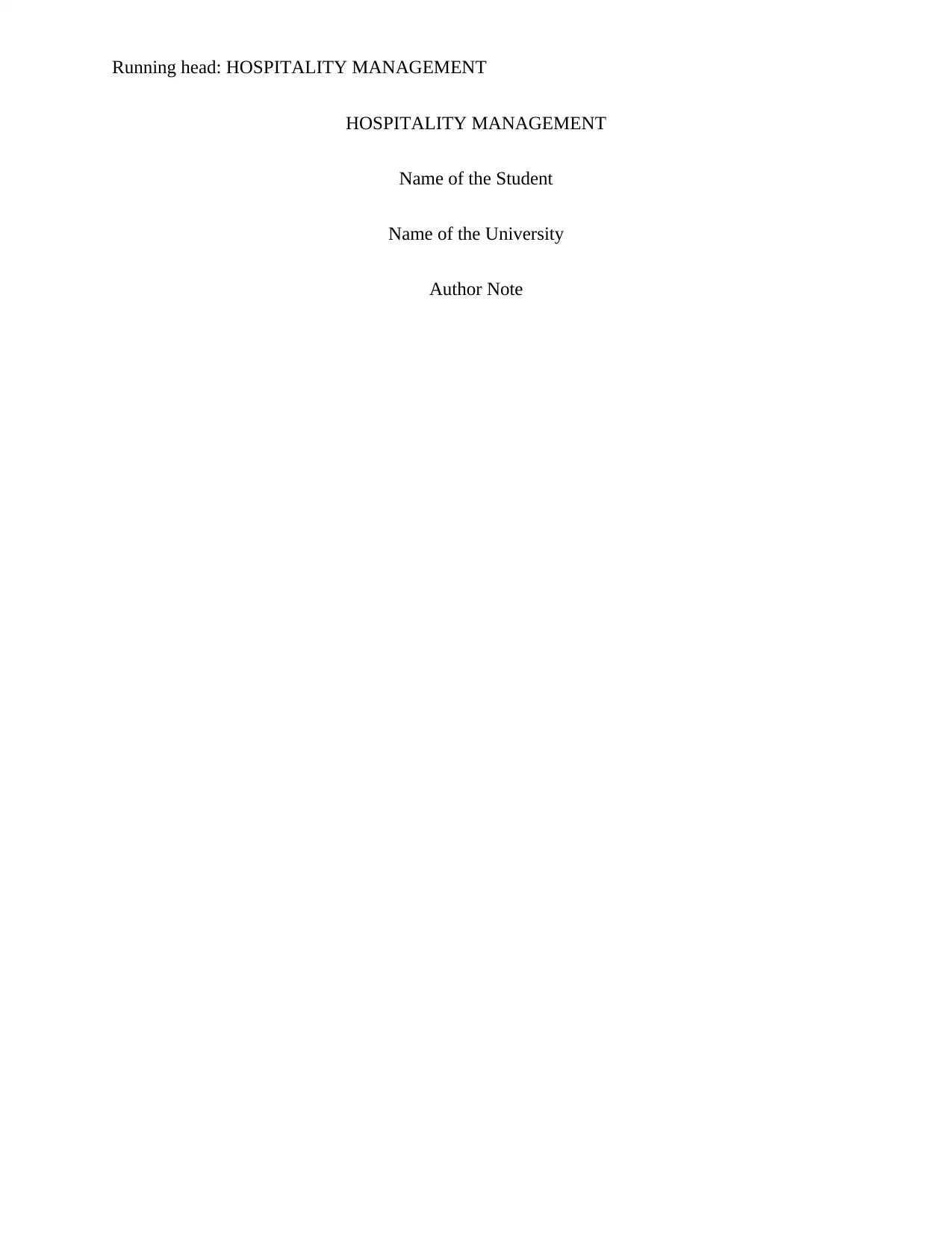
Running head: HOSPITALITY MANAGEMENT
HOSPITALITY MANAGEMENT
Name of the Student
Name of the University
Author Note
HOSPITALITY MANAGEMENT
Name of the Student
Name of the University
Author Note
Paraphrase This Document
Need a fresh take? Get an instant paraphrase of this document with our AI Paraphraser
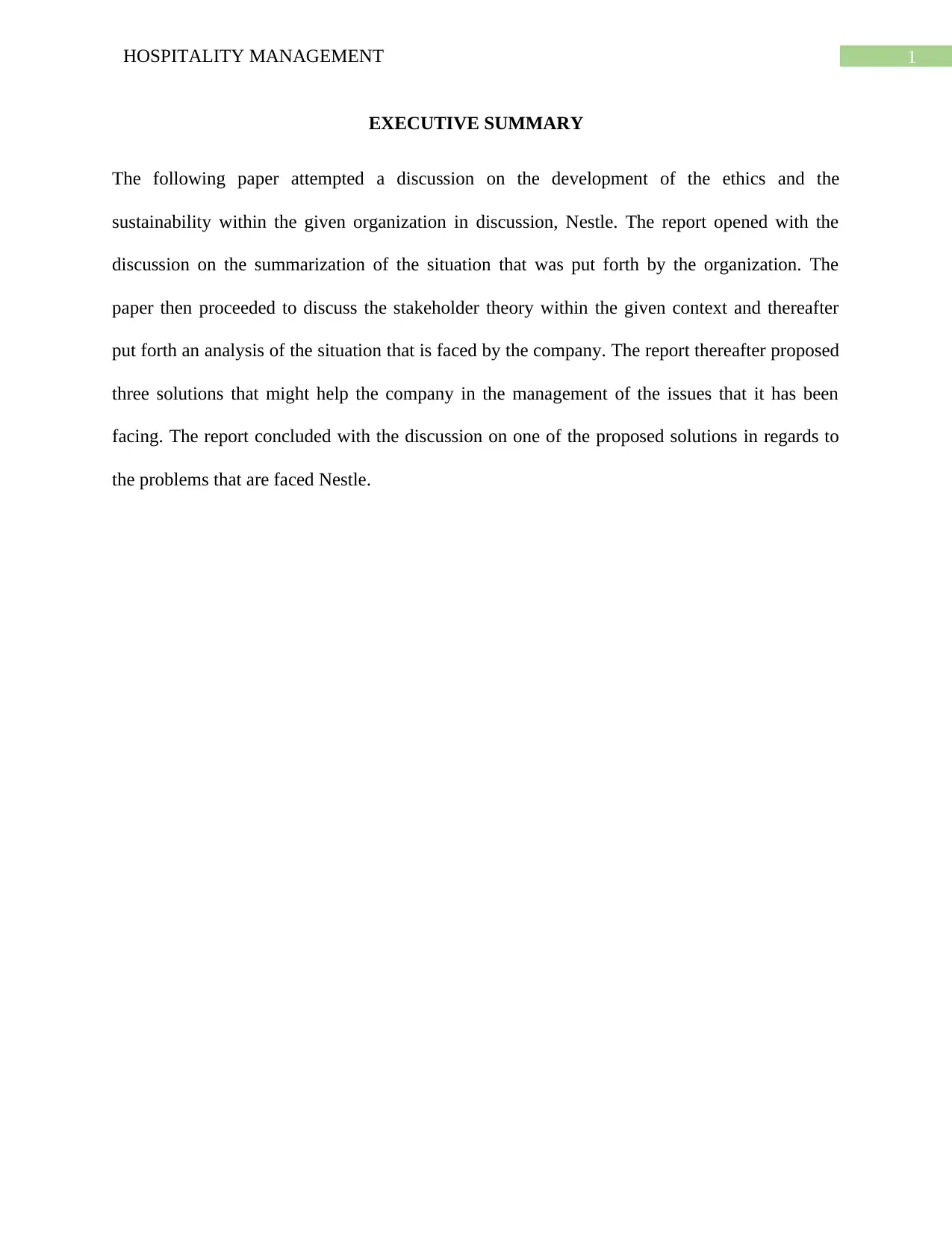
1HOSPITALITY MANAGEMENT
EXECUTIVE SUMMARY
The following paper attempted a discussion on the development of the ethics and the
sustainability within the given organization in discussion, Nestle. The report opened with the
discussion on the summarization of the situation that was put forth by the organization. The
paper then proceeded to discuss the stakeholder theory within the given context and thereafter
put forth an analysis of the situation that is faced by the company. The report thereafter proposed
three solutions that might help the company in the management of the issues that it has been
facing. The report concluded with the discussion on one of the proposed solutions in regards to
the problems that are faced Nestle.
EXECUTIVE SUMMARY
The following paper attempted a discussion on the development of the ethics and the
sustainability within the given organization in discussion, Nestle. The report opened with the
discussion on the summarization of the situation that was put forth by the organization. The
paper then proceeded to discuss the stakeholder theory within the given context and thereafter
put forth an analysis of the situation that is faced by the company. The report thereafter proposed
three solutions that might help the company in the management of the issues that it has been
facing. The report concluded with the discussion on one of the proposed solutions in regards to
the problems that are faced Nestle.
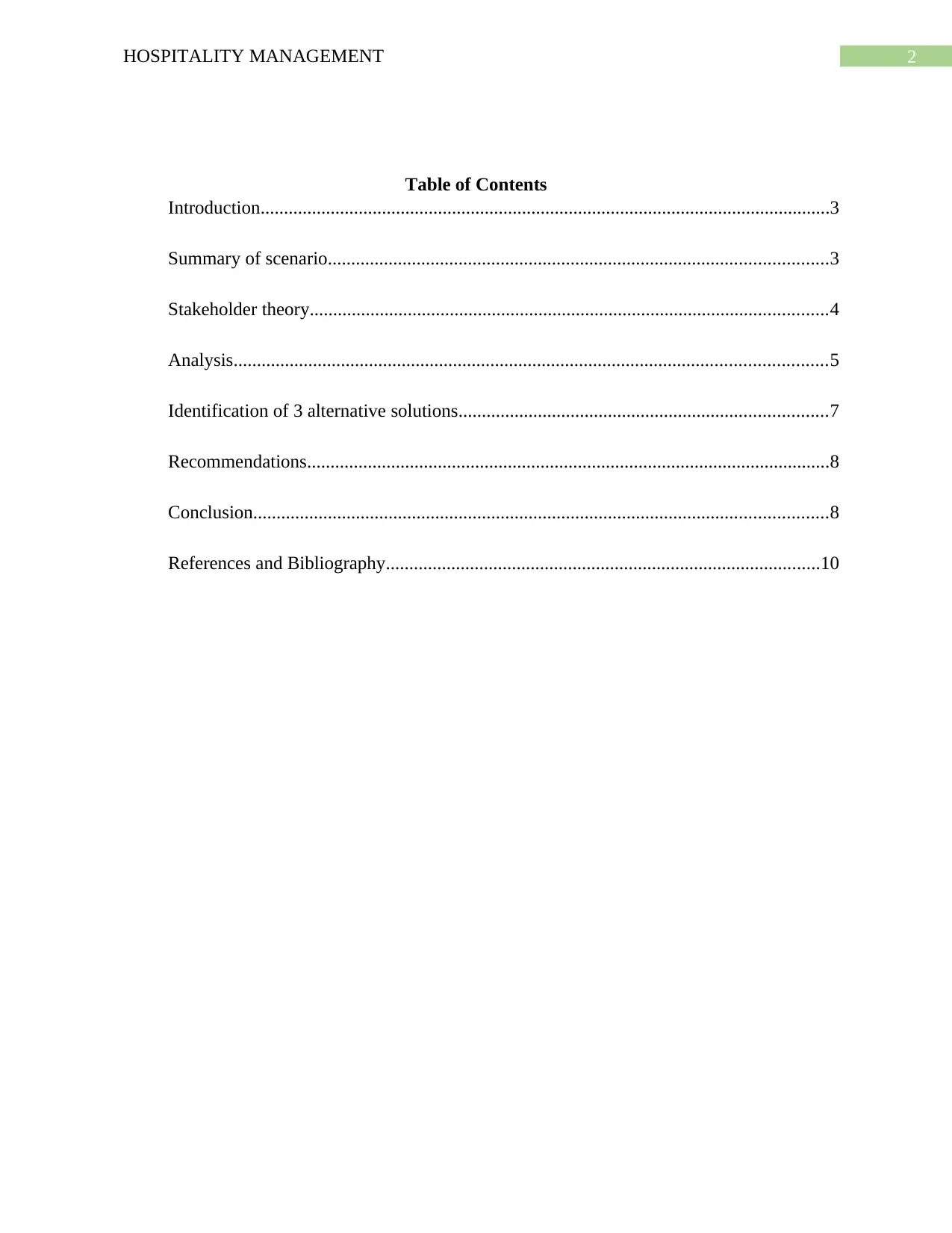
2HOSPITALITY MANAGEMENT
Table of Contents
Introduction..........................................................................................................................3
Summary of scenario...........................................................................................................3
Stakeholder theory...............................................................................................................4
Analysis...............................................................................................................................5
Identification of 3 alternative solutions...............................................................................7
Recommendations................................................................................................................8
Conclusion...........................................................................................................................8
References and Bibliography.............................................................................................10
Table of Contents
Introduction..........................................................................................................................3
Summary of scenario...........................................................................................................3
Stakeholder theory...............................................................................................................4
Analysis...............................................................................................................................5
Identification of 3 alternative solutions...............................................................................7
Recommendations................................................................................................................8
Conclusion...........................................................................................................................8
References and Bibliography.............................................................................................10
⊘ This is a preview!⊘
Do you want full access?
Subscribe today to unlock all pages.

Trusted by 1+ million students worldwide
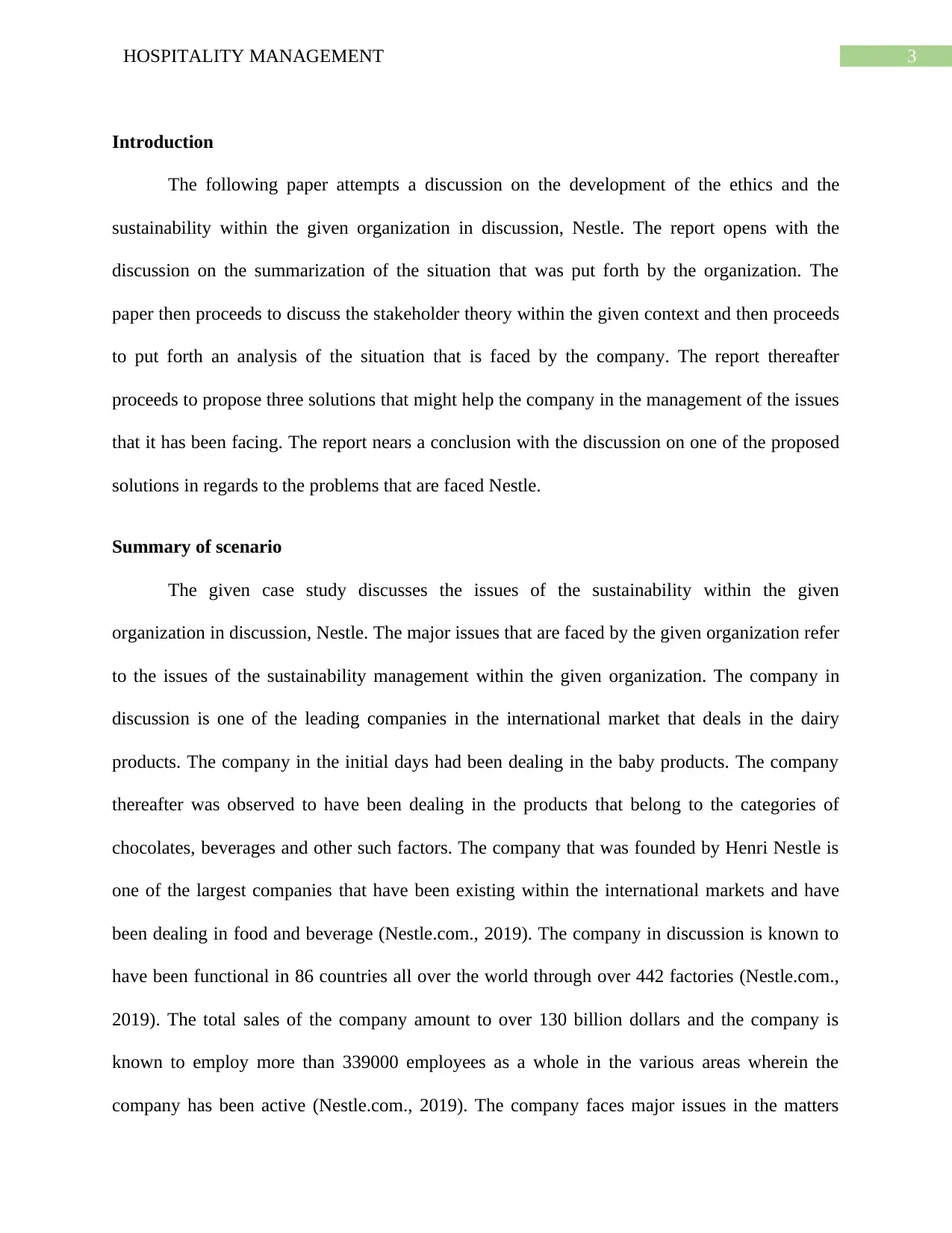
3HOSPITALITY MANAGEMENT
Introduction
The following paper attempts a discussion on the development of the ethics and the
sustainability within the given organization in discussion, Nestle. The report opens with the
discussion on the summarization of the situation that was put forth by the organization. The
paper then proceeds to discuss the stakeholder theory within the given context and then proceeds
to put forth an analysis of the situation that is faced by the company. The report thereafter
proceeds to propose three solutions that might help the company in the management of the issues
that it has been facing. The report nears a conclusion with the discussion on one of the proposed
solutions in regards to the problems that are faced Nestle.
Summary of scenario
The given case study discusses the issues of the sustainability within the given
organization in discussion, Nestle. The major issues that are faced by the given organization refer
to the issues of the sustainability management within the given organization. The company in
discussion is one of the leading companies in the international market that deals in the dairy
products. The company in the initial days had been dealing in the baby products. The company
thereafter was observed to have been dealing in the products that belong to the categories of
chocolates, beverages and other such factors. The company that was founded by Henri Nestle is
one of the largest companies that have been existing within the international markets and have
been dealing in food and beverage (Nestle.com., 2019). The company in discussion is known to
have been functional in 86 countries all over the world through over 442 factories (Nestle.com.,
2019). The total sales of the company amount to over 130 billion dollars and the company is
known to employ more than 339000 employees as a whole in the various areas wherein the
company has been active (Nestle.com., 2019). The company faces major issues in the matters
Introduction
The following paper attempts a discussion on the development of the ethics and the
sustainability within the given organization in discussion, Nestle. The report opens with the
discussion on the summarization of the situation that was put forth by the organization. The
paper then proceeds to discuss the stakeholder theory within the given context and then proceeds
to put forth an analysis of the situation that is faced by the company. The report thereafter
proceeds to propose three solutions that might help the company in the management of the issues
that it has been facing. The report nears a conclusion with the discussion on one of the proposed
solutions in regards to the problems that are faced Nestle.
Summary of scenario
The given case study discusses the issues of the sustainability within the given
organization in discussion, Nestle. The major issues that are faced by the given organization refer
to the issues of the sustainability management within the given organization. The company in
discussion is one of the leading companies in the international market that deals in the dairy
products. The company in the initial days had been dealing in the baby products. The company
thereafter was observed to have been dealing in the products that belong to the categories of
chocolates, beverages and other such factors. The company that was founded by Henri Nestle is
one of the largest companies that have been existing within the international markets and have
been dealing in food and beverage (Nestle.com., 2019). The company in discussion is known to
have been functional in 86 countries all over the world through over 442 factories (Nestle.com.,
2019). The total sales of the company amount to over 130 billion dollars and the company is
known to employ more than 339000 employees as a whole in the various areas wherein the
company has been active (Nestle.com., 2019). The company faces major issues in the matters
Paraphrase This Document
Need a fresh take? Get an instant paraphrase of this document with our AI Paraphraser
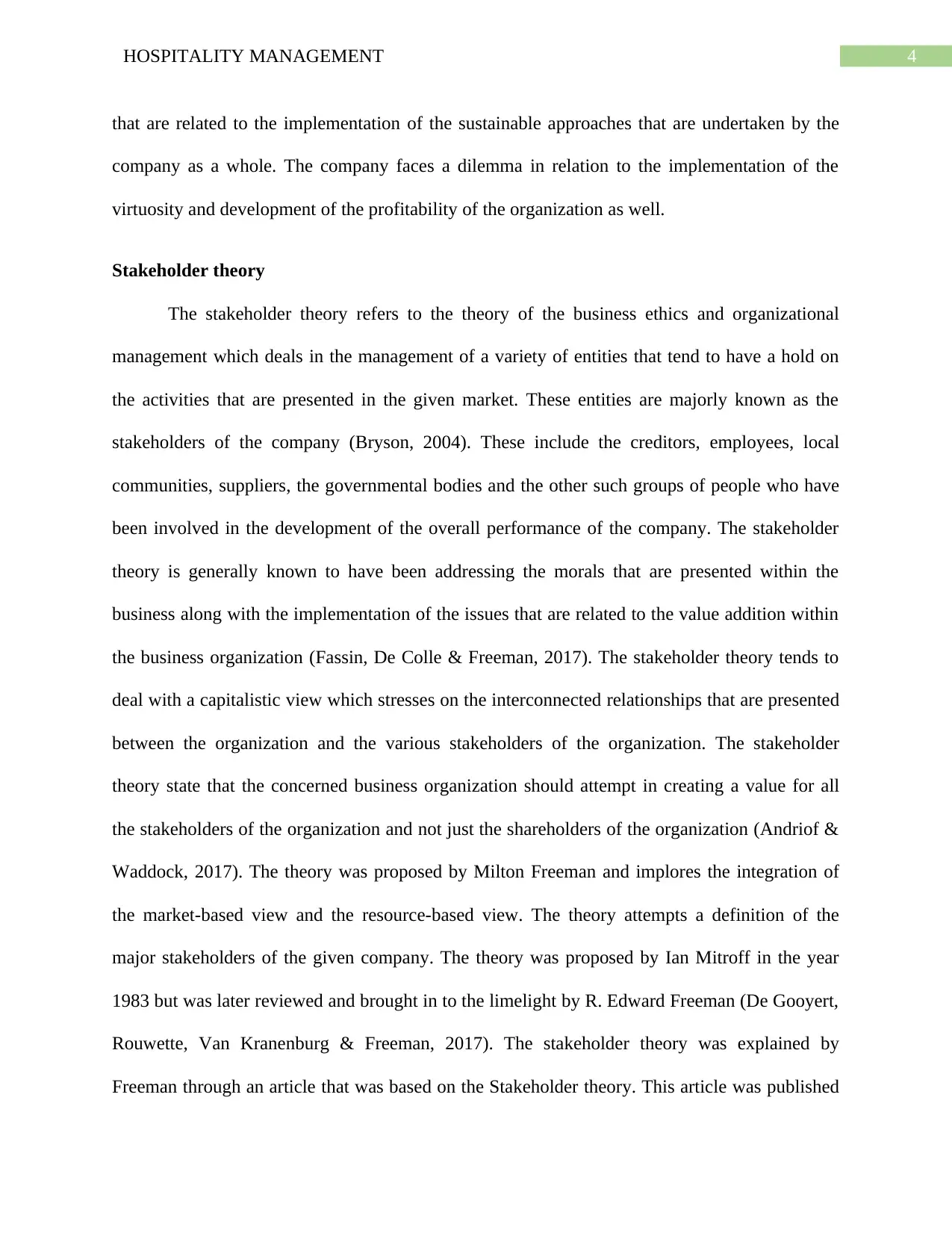
4HOSPITALITY MANAGEMENT
that are related to the implementation of the sustainable approaches that are undertaken by the
company as a whole. The company faces a dilemma in relation to the implementation of the
virtuosity and development of the profitability of the organization as well.
Stakeholder theory
The stakeholder theory refers to the theory of the business ethics and organizational
management which deals in the management of a variety of entities that tend to have a hold on
the activities that are presented in the given market. These entities are majorly known as the
stakeholders of the company (Bryson, 2004). These include the creditors, employees, local
communities, suppliers, the governmental bodies and the other such groups of people who have
been involved in the development of the overall performance of the company. The stakeholder
theory is generally known to have been addressing the morals that are presented within the
business along with the implementation of the issues that are related to the value addition within
the business organization (Fassin, De Colle & Freeman, 2017). The stakeholder theory tends to
deal with a capitalistic view which stresses on the interconnected relationships that are presented
between the organization and the various stakeholders of the organization. The stakeholder
theory state that the concerned business organization should attempt in creating a value for all
the stakeholders of the organization and not just the shareholders of the organization (Andriof &
Waddock, 2017). The theory was proposed by Milton Freeman and implores the integration of
the market-based view and the resource-based view. The theory attempts a definition of the
major stakeholders of the given company. The theory was proposed by Ian Mitroff in the year
1983 but was later reviewed and brought in to the limelight by R. Edward Freeman (De Gooyert,
Rouwette, Van Kranenburg & Freeman, 2017). The stakeholder theory was explained by
Freeman through an article that was based on the Stakeholder theory. This article was published
that are related to the implementation of the sustainable approaches that are undertaken by the
company as a whole. The company faces a dilemma in relation to the implementation of the
virtuosity and development of the profitability of the organization as well.
Stakeholder theory
The stakeholder theory refers to the theory of the business ethics and organizational
management which deals in the management of a variety of entities that tend to have a hold on
the activities that are presented in the given market. These entities are majorly known as the
stakeholders of the company (Bryson, 2004). These include the creditors, employees, local
communities, suppliers, the governmental bodies and the other such groups of people who have
been involved in the development of the overall performance of the company. The stakeholder
theory is generally known to have been addressing the morals that are presented within the
business along with the implementation of the issues that are related to the value addition within
the business organization (Fassin, De Colle & Freeman, 2017). The stakeholder theory tends to
deal with a capitalistic view which stresses on the interconnected relationships that are presented
between the organization and the various stakeholders of the organization. The stakeholder
theory state that the concerned business organization should attempt in creating a value for all
the stakeholders of the organization and not just the shareholders of the organization (Andriof &
Waddock, 2017). The theory was proposed by Milton Freeman and implores the integration of
the market-based view and the resource-based view. The theory attempts a definition of the
major stakeholders of the given company. The theory was proposed by Ian Mitroff in the year
1983 but was later reviewed and brought in to the limelight by R. Edward Freeman (De Gooyert,
Rouwette, Van Kranenburg & Freeman, 2017). The stakeholder theory was explained by
Freeman through an article that was based on the Stakeholder theory. This article was published
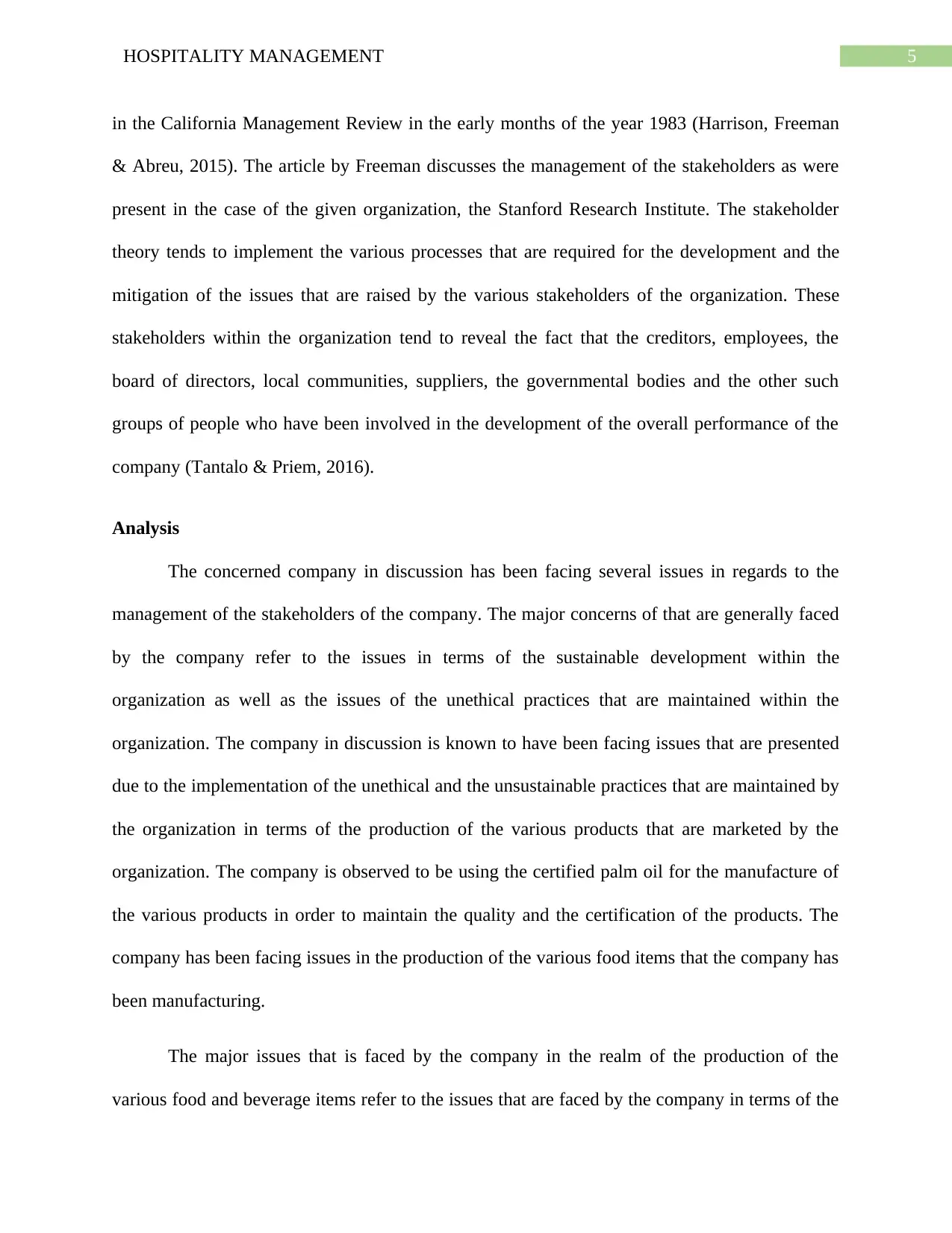
5HOSPITALITY MANAGEMENT
in the California Management Review in the early months of the year 1983 (Harrison, Freeman
& Abreu, 2015). The article by Freeman discusses the management of the stakeholders as were
present in the case of the given organization, the Stanford Research Institute. The stakeholder
theory tends to implement the various processes that are required for the development and the
mitigation of the issues that are raised by the various stakeholders of the organization. These
stakeholders within the organization tend to reveal the fact that the creditors, employees, the
board of directors, local communities, suppliers, the governmental bodies and the other such
groups of people who have been involved in the development of the overall performance of the
company (Tantalo & Priem, 2016).
Analysis
The concerned company in discussion has been facing several issues in regards to the
management of the stakeholders of the company. The major concerns of that are generally faced
by the company refer to the issues in terms of the sustainable development within the
organization as well as the issues of the unethical practices that are maintained within the
organization. The company in discussion is known to have been facing issues that are presented
due to the implementation of the unethical and the unsustainable practices that are maintained by
the organization in terms of the production of the various products that are marketed by the
organization. The company is observed to be using the certified palm oil for the manufacture of
the various products in order to maintain the quality and the certification of the products. The
company has been facing issues in the production of the various food items that the company has
been manufacturing.
The major issues that is faced by the company in the realm of the production of the
various food and beverage items refer to the issues that are faced by the company in terms of the
in the California Management Review in the early months of the year 1983 (Harrison, Freeman
& Abreu, 2015). The article by Freeman discusses the management of the stakeholders as were
present in the case of the given organization, the Stanford Research Institute. The stakeholder
theory tends to implement the various processes that are required for the development and the
mitigation of the issues that are raised by the various stakeholders of the organization. These
stakeholders within the organization tend to reveal the fact that the creditors, employees, the
board of directors, local communities, suppliers, the governmental bodies and the other such
groups of people who have been involved in the development of the overall performance of the
company (Tantalo & Priem, 2016).
Analysis
The concerned company in discussion has been facing several issues in regards to the
management of the stakeholders of the company. The major concerns of that are generally faced
by the company refer to the issues in terms of the sustainable development within the
organization as well as the issues of the unethical practices that are maintained within the
organization. The company in discussion is known to have been facing issues that are presented
due to the implementation of the unethical and the unsustainable practices that are maintained by
the organization in terms of the production of the various products that are marketed by the
organization. The company is observed to be using the certified palm oil for the manufacture of
the various products in order to maintain the quality and the certification of the products. The
company has been facing issues in the production of the various food items that the company has
been manufacturing.
The major issues that is faced by the company in the realm of the production of the
various food and beverage items refer to the issues that are faced by the company in terms of the
⊘ This is a preview!⊘
Do you want full access?
Subscribe today to unlock all pages.

Trusted by 1+ million students worldwide
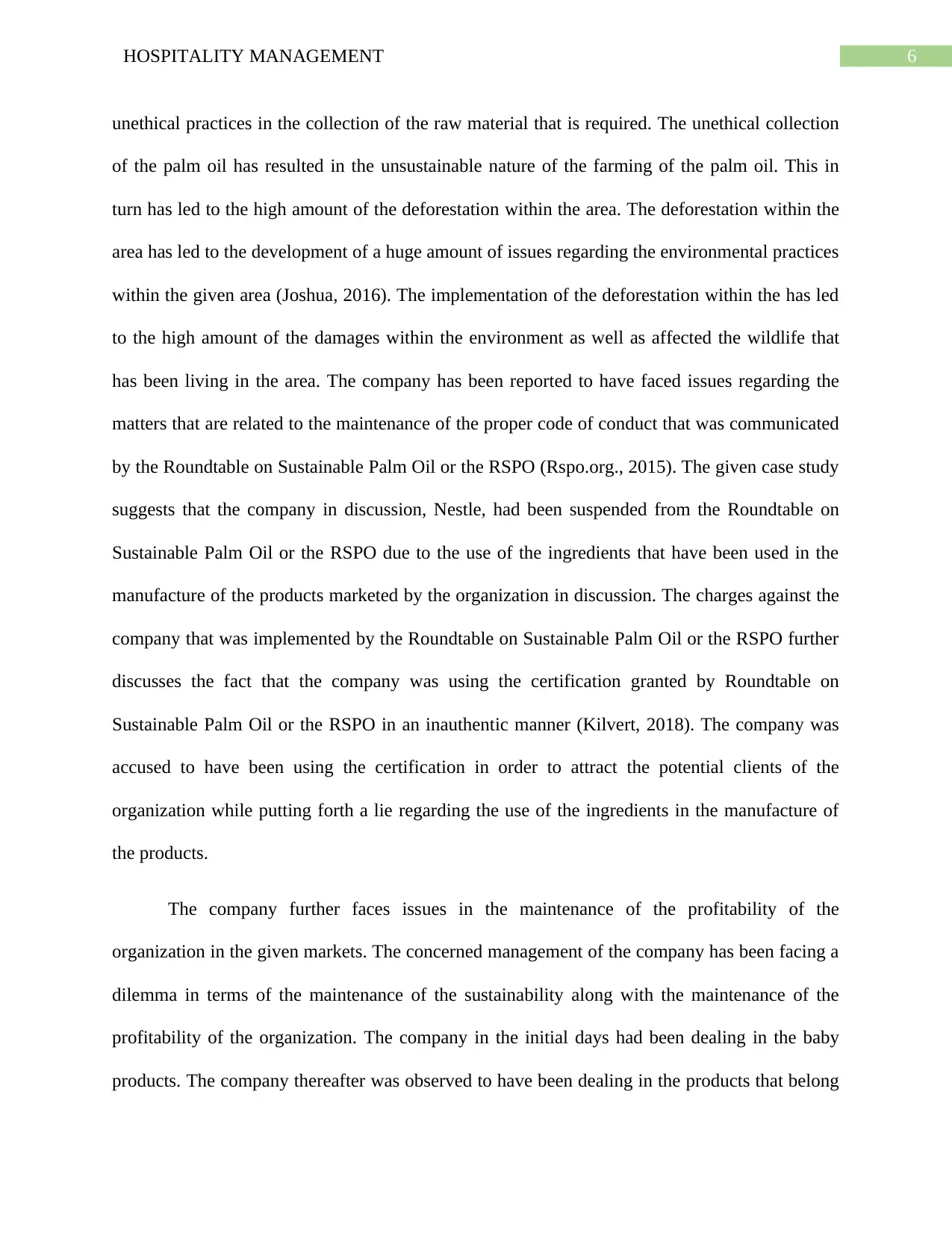
6HOSPITALITY MANAGEMENT
unethical practices in the collection of the raw material that is required. The unethical collection
of the palm oil has resulted in the unsustainable nature of the farming of the palm oil. This in
turn has led to the high amount of the deforestation within the area. The deforestation within the
area has led to the development of a huge amount of issues regarding the environmental practices
within the given area (Joshua, 2016). The implementation of the deforestation within the has led
to the high amount of the damages within the environment as well as affected the wildlife that
has been living in the area. The company has been reported to have faced issues regarding the
matters that are related to the maintenance of the proper code of conduct that was communicated
by the Roundtable on Sustainable Palm Oil or the RSPO (Rspo.org., 2015). The given case study
suggests that the company in discussion, Nestle, had been suspended from the Roundtable on
Sustainable Palm Oil or the RSPO due to the use of the ingredients that have been used in the
manufacture of the products marketed by the organization in discussion. The charges against the
company that was implemented by the Roundtable on Sustainable Palm Oil or the RSPO further
discusses the fact that the company was using the certification granted by Roundtable on
Sustainable Palm Oil or the RSPO in an inauthentic manner (Kilvert, 2018). The company was
accused to have been using the certification in order to attract the potential clients of the
organization while putting forth a lie regarding the use of the ingredients in the manufacture of
the products.
The company further faces issues in the maintenance of the profitability of the
organization in the given markets. The concerned management of the company has been facing a
dilemma in terms of the maintenance of the sustainability along with the maintenance of the
profitability of the organization. The company in the initial days had been dealing in the baby
products. The company thereafter was observed to have been dealing in the products that belong
unethical practices in the collection of the raw material that is required. The unethical collection
of the palm oil has resulted in the unsustainable nature of the farming of the palm oil. This in
turn has led to the high amount of the deforestation within the area. The deforestation within the
area has led to the development of a huge amount of issues regarding the environmental practices
within the given area (Joshua, 2016). The implementation of the deforestation within the has led
to the high amount of the damages within the environment as well as affected the wildlife that
has been living in the area. The company has been reported to have faced issues regarding the
matters that are related to the maintenance of the proper code of conduct that was communicated
by the Roundtable on Sustainable Palm Oil or the RSPO (Rspo.org., 2015). The given case study
suggests that the company in discussion, Nestle, had been suspended from the Roundtable on
Sustainable Palm Oil or the RSPO due to the use of the ingredients that have been used in the
manufacture of the products marketed by the organization in discussion. The charges against the
company that was implemented by the Roundtable on Sustainable Palm Oil or the RSPO further
discusses the fact that the company was using the certification granted by Roundtable on
Sustainable Palm Oil or the RSPO in an inauthentic manner (Kilvert, 2018). The company was
accused to have been using the certification in order to attract the potential clients of the
organization while putting forth a lie regarding the use of the ingredients in the manufacture of
the products.
The company further faces issues in the maintenance of the profitability of the
organization in the given markets. The concerned management of the company has been facing a
dilemma in terms of the maintenance of the sustainability along with the maintenance of the
profitability of the organization. The company in the initial days had been dealing in the baby
products. The company thereafter was observed to have been dealing in the products that belong
Paraphrase This Document
Need a fresh take? Get an instant paraphrase of this document with our AI Paraphraser
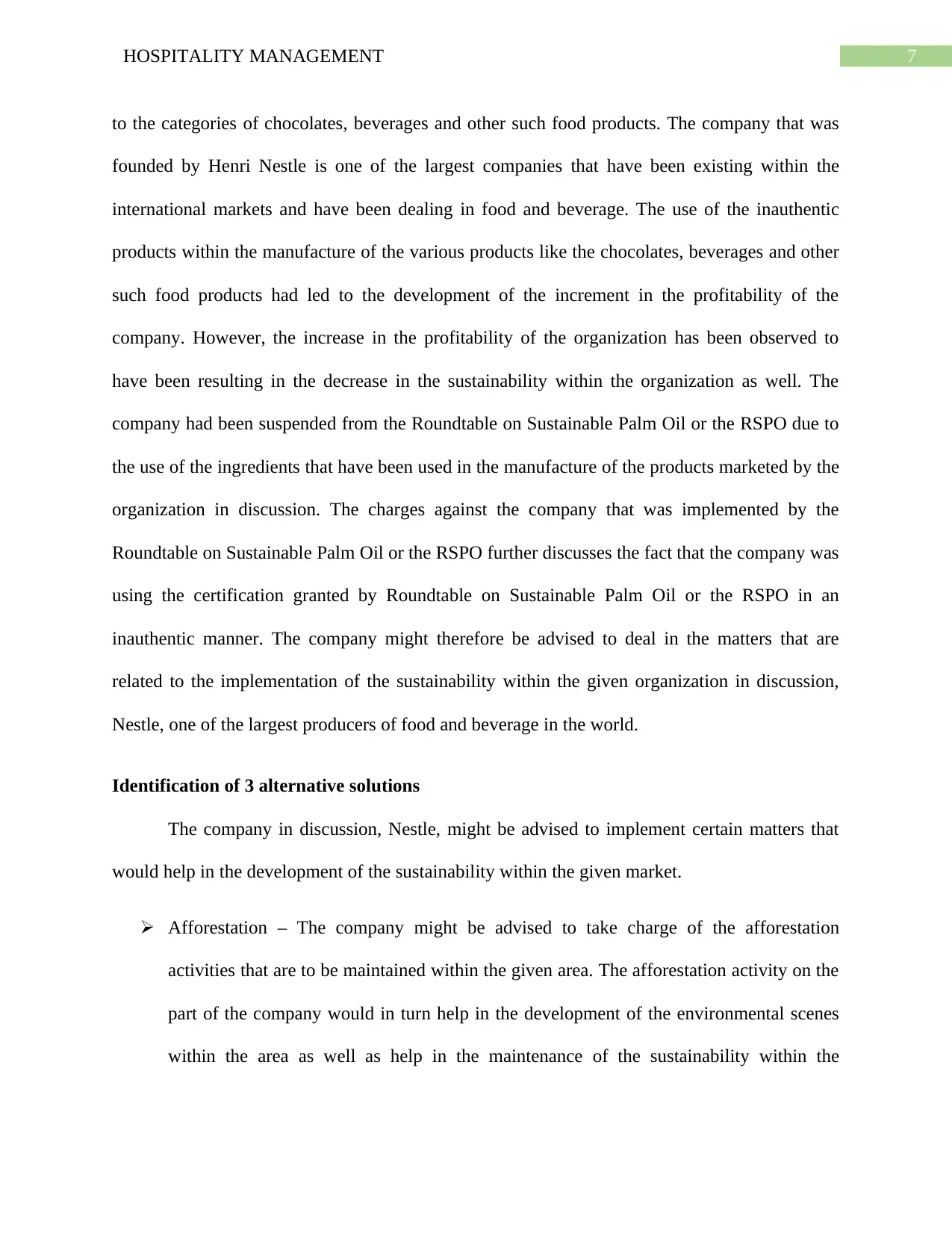
7HOSPITALITY MANAGEMENT
to the categories of chocolates, beverages and other such food products. The company that was
founded by Henri Nestle is one of the largest companies that have been existing within the
international markets and have been dealing in food and beverage. The use of the inauthentic
products within the manufacture of the various products like the chocolates, beverages and other
such food products had led to the development of the increment in the profitability of the
company. However, the increase in the profitability of the organization has been observed to
have been resulting in the decrease in the sustainability within the organization as well. The
company had been suspended from the Roundtable on Sustainable Palm Oil or the RSPO due to
the use of the ingredients that have been used in the manufacture of the products marketed by the
organization in discussion. The charges against the company that was implemented by the
Roundtable on Sustainable Palm Oil or the RSPO further discusses the fact that the company was
using the certification granted by Roundtable on Sustainable Palm Oil or the RSPO in an
inauthentic manner. The company might therefore be advised to deal in the matters that are
related to the implementation of the sustainability within the given organization in discussion,
Nestle, one of the largest producers of food and beverage in the world.
Identification of 3 alternative solutions
The company in discussion, Nestle, might be advised to implement certain matters that
would help in the development of the sustainability within the given market.
Afforestation – The company might be advised to take charge of the afforestation
activities that are to be maintained within the given area. The afforestation activity on the
part of the company would in turn help in the development of the environmental scenes
within the area as well as help in the maintenance of the sustainability within the
to the categories of chocolates, beverages and other such food products. The company that was
founded by Henri Nestle is one of the largest companies that have been existing within the
international markets and have been dealing in food and beverage. The use of the inauthentic
products within the manufacture of the various products like the chocolates, beverages and other
such food products had led to the development of the increment in the profitability of the
company. However, the increase in the profitability of the organization has been observed to
have been resulting in the decrease in the sustainability within the organization as well. The
company had been suspended from the Roundtable on Sustainable Palm Oil or the RSPO due to
the use of the ingredients that have been used in the manufacture of the products marketed by the
organization in discussion. The charges against the company that was implemented by the
Roundtable on Sustainable Palm Oil or the RSPO further discusses the fact that the company was
using the certification granted by Roundtable on Sustainable Palm Oil or the RSPO in an
inauthentic manner. The company might therefore be advised to deal in the matters that are
related to the implementation of the sustainability within the given organization in discussion,
Nestle, one of the largest producers of food and beverage in the world.
Identification of 3 alternative solutions
The company in discussion, Nestle, might be advised to implement certain matters that
would help in the development of the sustainability within the given market.
Afforestation – The company might be advised to take charge of the afforestation
activities that are to be maintained within the given area. The afforestation activity on the
part of the company would in turn help in the development of the environmental scenes
within the area as well as help in the maintenance of the sustainability within the
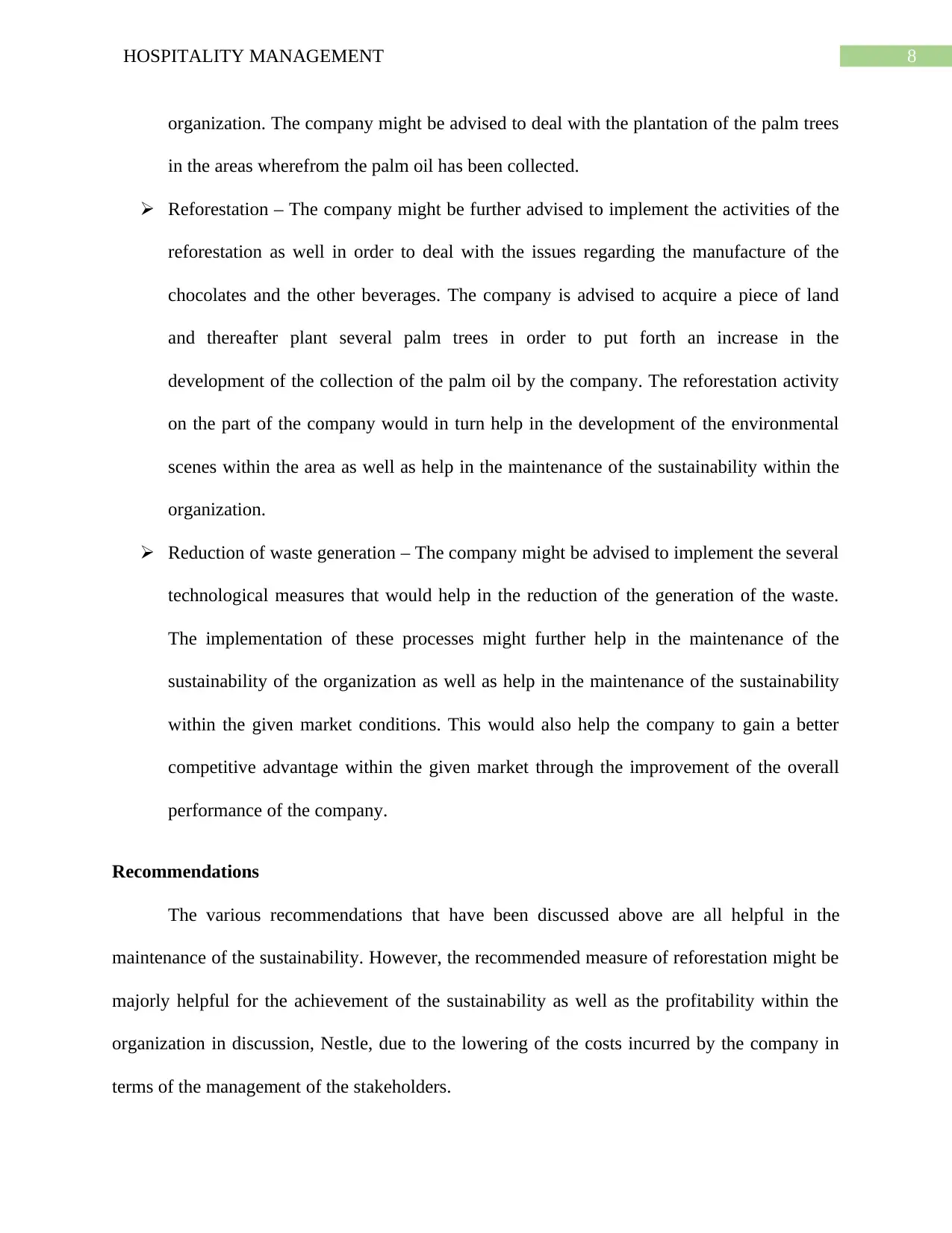
8HOSPITALITY MANAGEMENT
organization. The company might be advised to deal with the plantation of the palm trees
in the areas wherefrom the palm oil has been collected.
Reforestation – The company might be further advised to implement the activities of the
reforestation as well in order to deal with the issues regarding the manufacture of the
chocolates and the other beverages. The company is advised to acquire a piece of land
and thereafter plant several palm trees in order to put forth an increase in the
development of the collection of the palm oil by the company. The reforestation activity
on the part of the company would in turn help in the development of the environmental
scenes within the area as well as help in the maintenance of the sustainability within the
organization.
Reduction of waste generation – The company might be advised to implement the several
technological measures that would help in the reduction of the generation of the waste.
The implementation of these processes might further help in the maintenance of the
sustainability of the organization as well as help in the maintenance of the sustainability
within the given market conditions. This would also help the company to gain a better
competitive advantage within the given market through the improvement of the overall
performance of the company.
Recommendations
The various recommendations that have been discussed above are all helpful in the
maintenance of the sustainability. However, the recommended measure of reforestation might be
majorly helpful for the achievement of the sustainability as well as the profitability within the
organization in discussion, Nestle, due to the lowering of the costs incurred by the company in
terms of the management of the stakeholders.
organization. The company might be advised to deal with the plantation of the palm trees
in the areas wherefrom the palm oil has been collected.
Reforestation – The company might be further advised to implement the activities of the
reforestation as well in order to deal with the issues regarding the manufacture of the
chocolates and the other beverages. The company is advised to acquire a piece of land
and thereafter plant several palm trees in order to put forth an increase in the
development of the collection of the palm oil by the company. The reforestation activity
on the part of the company would in turn help in the development of the environmental
scenes within the area as well as help in the maintenance of the sustainability within the
organization.
Reduction of waste generation – The company might be advised to implement the several
technological measures that would help in the reduction of the generation of the waste.
The implementation of these processes might further help in the maintenance of the
sustainability of the organization as well as help in the maintenance of the sustainability
within the given market conditions. This would also help the company to gain a better
competitive advantage within the given market through the improvement of the overall
performance of the company.
Recommendations
The various recommendations that have been discussed above are all helpful in the
maintenance of the sustainability. However, the recommended measure of reforestation might be
majorly helpful for the achievement of the sustainability as well as the profitability within the
organization in discussion, Nestle, due to the lowering of the costs incurred by the company in
terms of the management of the stakeholders.
⊘ This is a preview!⊘
Do you want full access?
Subscribe today to unlock all pages.

Trusted by 1+ million students worldwide
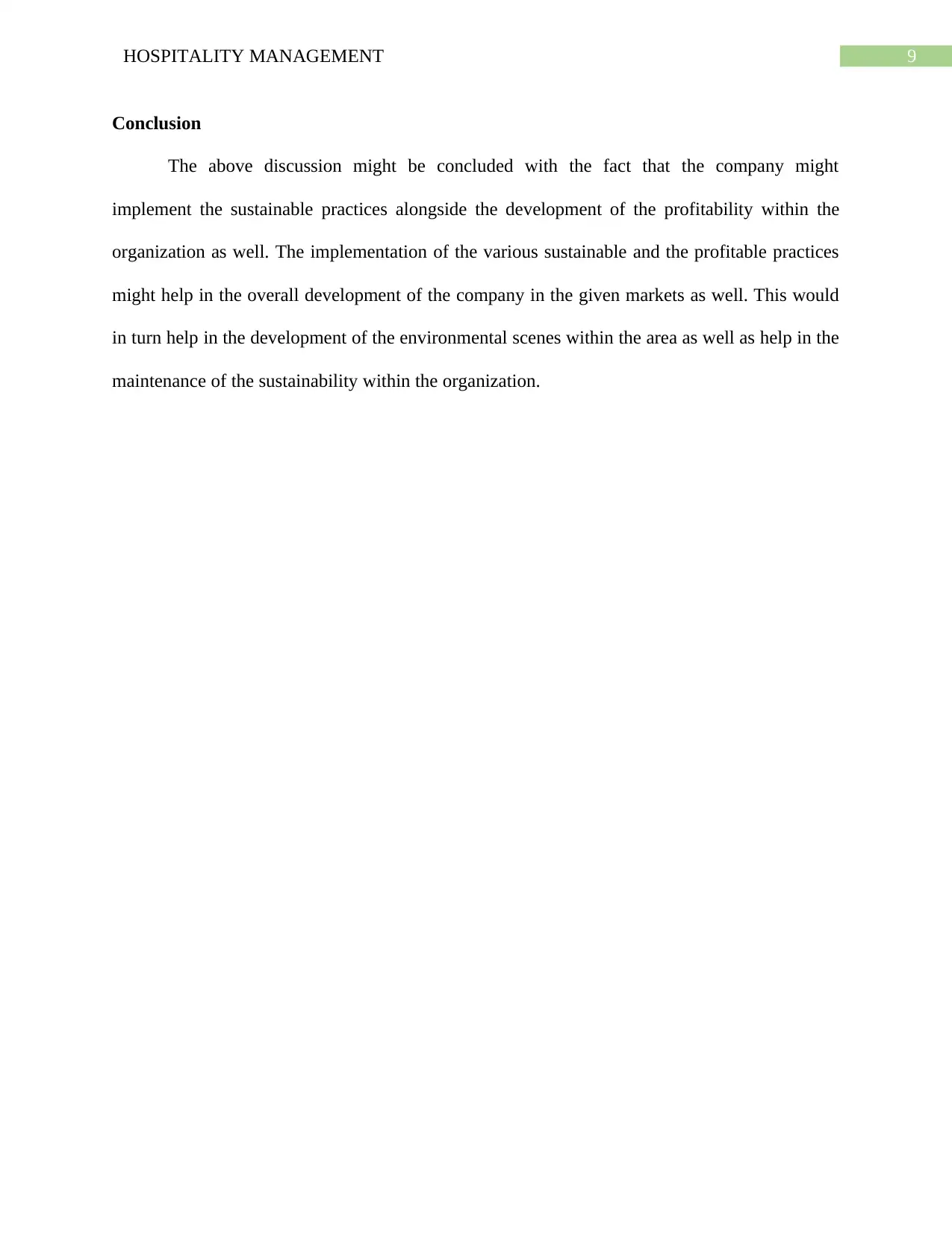
9HOSPITALITY MANAGEMENT
Conclusion
The above discussion might be concluded with the fact that the company might
implement the sustainable practices alongside the development of the profitability within the
organization as well. The implementation of the various sustainable and the profitable practices
might help in the overall development of the company in the given markets as well. This would
in turn help in the development of the environmental scenes within the area as well as help in the
maintenance of the sustainability within the organization.
Conclusion
The above discussion might be concluded with the fact that the company might
implement the sustainable practices alongside the development of the profitability within the
organization as well. The implementation of the various sustainable and the profitable practices
might help in the overall development of the company in the given markets as well. This would
in turn help in the development of the environmental scenes within the area as well as help in the
maintenance of the sustainability within the organization.
Paraphrase This Document
Need a fresh take? Get an instant paraphrase of this document with our AI Paraphraser
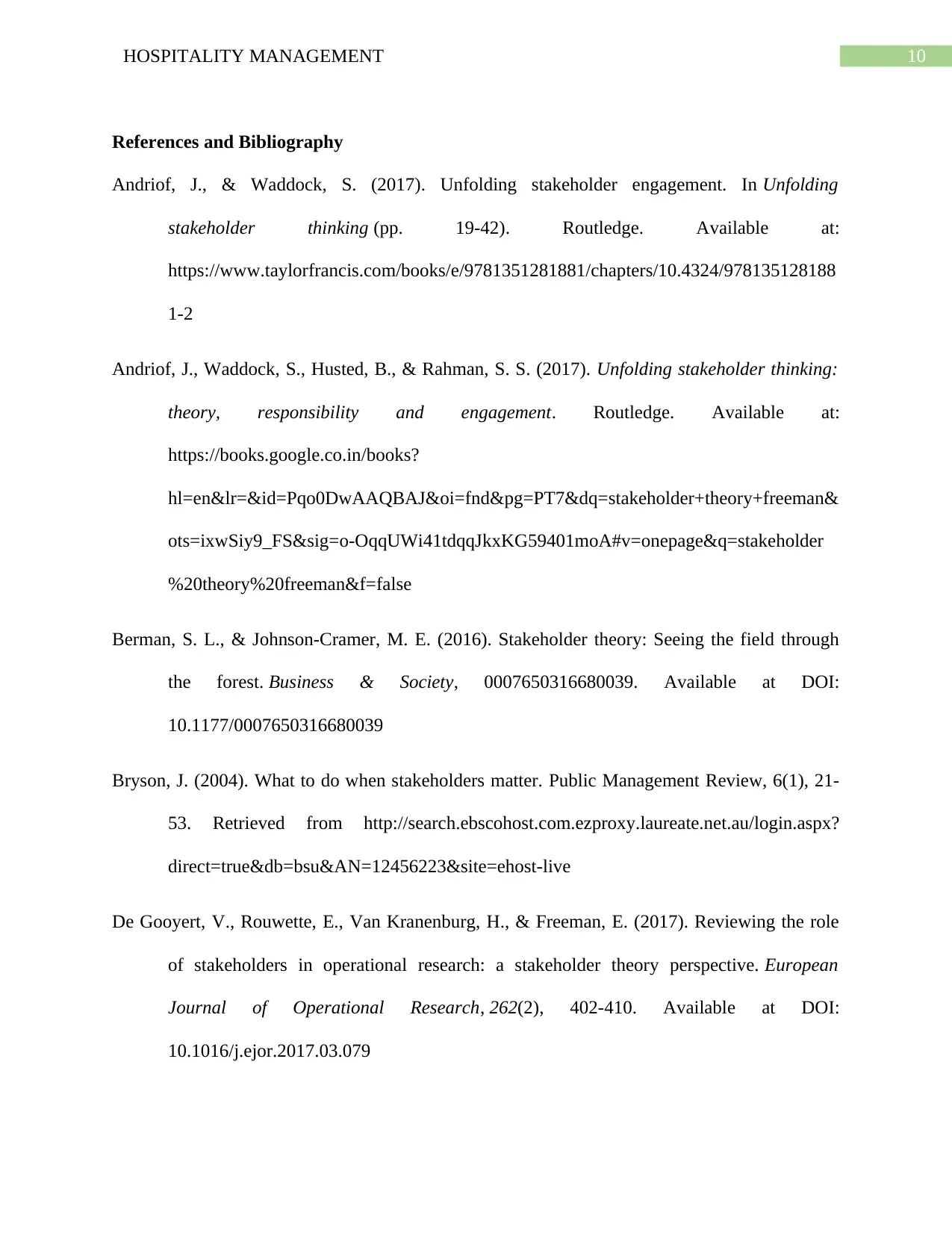
10HOSPITALITY MANAGEMENT
References and Bibliography
Andriof, J., & Waddock, S. (2017). Unfolding stakeholder engagement. In Unfolding
stakeholder thinking (pp. 19-42). Routledge. Available at:
https://www.taylorfrancis.com/books/e/9781351281881/chapters/10.4324/978135128188
1-2
Andriof, J., Waddock, S., Husted, B., & Rahman, S. S. (2017). Unfolding stakeholder thinking:
theory, responsibility and engagement. Routledge. Available at:
https://books.google.co.in/books?
hl=en&lr=&id=Pqo0DwAAQBAJ&oi=fnd&pg=PT7&dq=stakeholder+theory+freeman&
ots=ixwSiy9_FS&sig=o-OqqUWi41tdqqJkxKG59401moA#v=onepage&q=stakeholder
%20theory%20freeman&f=false
Berman, S. L., & Johnson-Cramer, M. E. (2016). Stakeholder theory: Seeing the field through
the forest. Business & Society, 0007650316680039. Available at DOI:
10.1177/0007650316680039
Bryson, J. (2004). What to do when stakeholders matter. Public Management Review, 6(1), 21-
53. Retrieved from http://search.ebscohost.com.ezproxy.laureate.net.au/login.aspx?
direct=true&db=bsu&AN=12456223&site=ehost-live
De Gooyert, V., Rouwette, E., Van Kranenburg, H., & Freeman, E. (2017). Reviewing the role
of stakeholders in operational research: a stakeholder theory perspective. European
Journal of Operational Research, 262(2), 402-410. Available at DOI:
10.1016/j.ejor.2017.03.079
References and Bibliography
Andriof, J., & Waddock, S. (2017). Unfolding stakeholder engagement. In Unfolding
stakeholder thinking (pp. 19-42). Routledge. Available at:
https://www.taylorfrancis.com/books/e/9781351281881/chapters/10.4324/978135128188
1-2
Andriof, J., Waddock, S., Husted, B., & Rahman, S. S. (2017). Unfolding stakeholder thinking:
theory, responsibility and engagement. Routledge. Available at:
https://books.google.co.in/books?
hl=en&lr=&id=Pqo0DwAAQBAJ&oi=fnd&pg=PT7&dq=stakeholder+theory+freeman&
ots=ixwSiy9_FS&sig=o-OqqUWi41tdqqJkxKG59401moA#v=onepage&q=stakeholder
%20theory%20freeman&f=false
Berman, S. L., & Johnson-Cramer, M. E. (2016). Stakeholder theory: Seeing the field through
the forest. Business & Society, 0007650316680039. Available at DOI:
10.1177/0007650316680039
Bryson, J. (2004). What to do when stakeholders matter. Public Management Review, 6(1), 21-
53. Retrieved from http://search.ebscohost.com.ezproxy.laureate.net.au/login.aspx?
direct=true&db=bsu&AN=12456223&site=ehost-live
De Gooyert, V., Rouwette, E., Van Kranenburg, H., & Freeman, E. (2017). Reviewing the role
of stakeholders in operational research: a stakeholder theory perspective. European
Journal of Operational Research, 262(2), 402-410. Available at DOI:
10.1016/j.ejor.2017.03.079
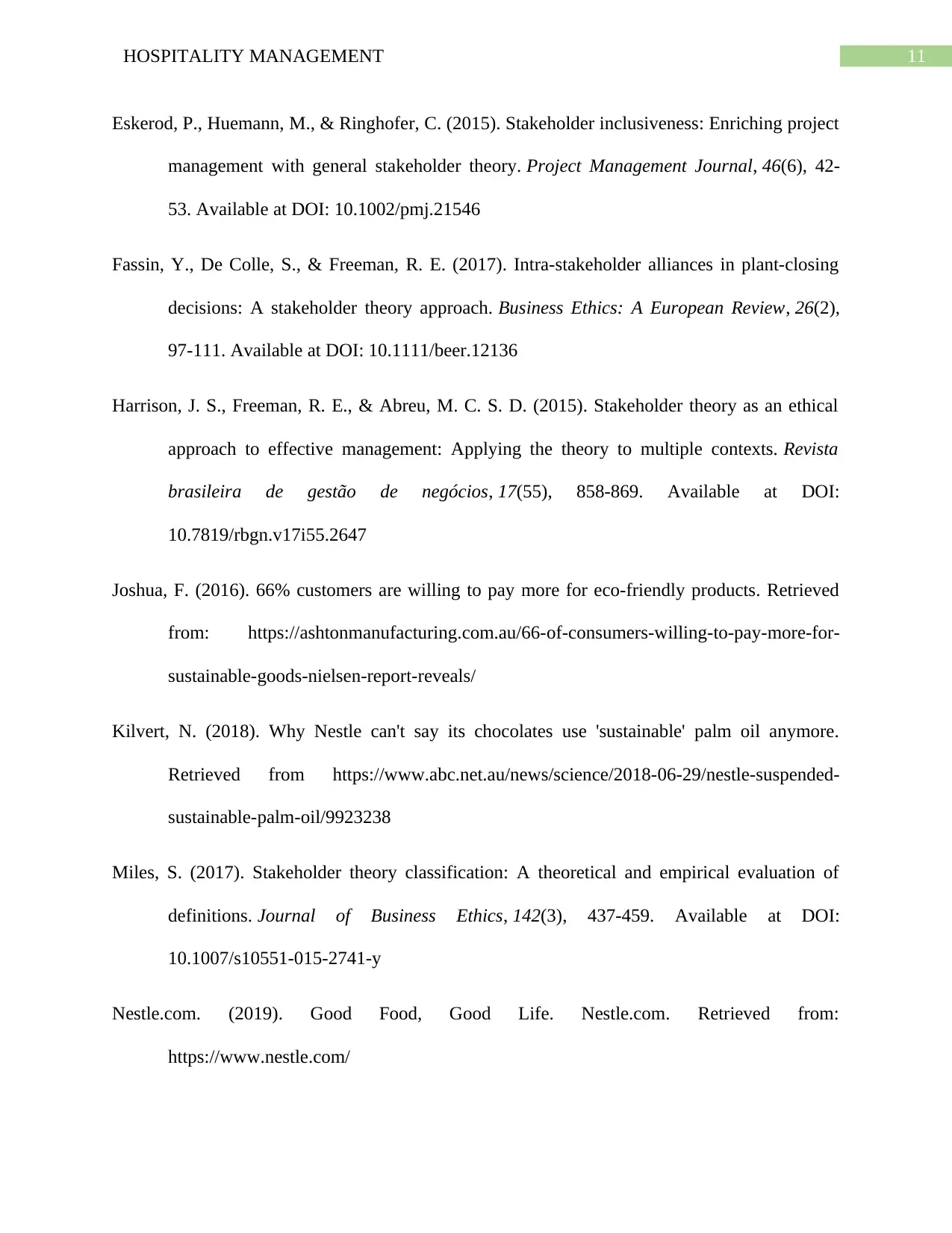
11HOSPITALITY MANAGEMENT
Eskerod, P., Huemann, M., & Ringhofer, C. (2015). Stakeholder inclusiveness: Enriching project
management with general stakeholder theory. Project Management Journal, 46(6), 42-
53. Available at DOI: 10.1002/pmj.21546
Fassin, Y., De Colle, S., & Freeman, R. E. (2017). Intra‐stakeholder alliances in plant‐closing
decisions: A stakeholder theory approach. Business Ethics: A European Review, 26(2),
97-111. Available at DOI: 10.1111/beer.12136
Harrison, J. S., Freeman, R. E., & Abreu, M. C. S. D. (2015). Stakeholder theory as an ethical
approach to effective management: Applying the theory to multiple contexts. Revista
brasileira de gestão de negócios, 17(55), 858-869. Available at DOI:
10.7819/rbgn.v17i55.2647
Joshua, F. (2016). 66% customers are willing to pay more for eco-friendly products. Retrieved
from: https://ashtonmanufacturing.com.au/66-of-consumers-willing-to-pay-more-for-
sustainable-goods-nielsen-report-reveals/
Kilvert, N. (2018). Why Nestle can't say its chocolates use 'sustainable' palm oil anymore.
Retrieved from https://www.abc.net.au/news/science/2018-06-29/nestle-suspended-
sustainable-palm-oil/9923238
Miles, S. (2017). Stakeholder theory classification: A theoretical and empirical evaluation of
definitions. Journal of Business Ethics, 142(3), 437-459. Available at DOI:
10.1007/s10551-015-2741-y
Nestle.com. (2019). Good Food, Good Life. Nestle.com. Retrieved from:
https://www.nestle.com/
Eskerod, P., Huemann, M., & Ringhofer, C. (2015). Stakeholder inclusiveness: Enriching project
management with general stakeholder theory. Project Management Journal, 46(6), 42-
53. Available at DOI: 10.1002/pmj.21546
Fassin, Y., De Colle, S., & Freeman, R. E. (2017). Intra‐stakeholder alliances in plant‐closing
decisions: A stakeholder theory approach. Business Ethics: A European Review, 26(2),
97-111. Available at DOI: 10.1111/beer.12136
Harrison, J. S., Freeman, R. E., & Abreu, M. C. S. D. (2015). Stakeholder theory as an ethical
approach to effective management: Applying the theory to multiple contexts. Revista
brasileira de gestão de negócios, 17(55), 858-869. Available at DOI:
10.7819/rbgn.v17i55.2647
Joshua, F. (2016). 66% customers are willing to pay more for eco-friendly products. Retrieved
from: https://ashtonmanufacturing.com.au/66-of-consumers-willing-to-pay-more-for-
sustainable-goods-nielsen-report-reveals/
Kilvert, N. (2018). Why Nestle can't say its chocolates use 'sustainable' palm oil anymore.
Retrieved from https://www.abc.net.au/news/science/2018-06-29/nestle-suspended-
sustainable-palm-oil/9923238
Miles, S. (2017). Stakeholder theory classification: A theoretical and empirical evaluation of
definitions. Journal of Business Ethics, 142(3), 437-459. Available at DOI:
10.1007/s10551-015-2741-y
Nestle.com. (2019). Good Food, Good Life. Nestle.com. Retrieved from:
https://www.nestle.com/
⊘ This is a preview!⊘
Do you want full access?
Subscribe today to unlock all pages.

Trusted by 1+ million students worldwide
1 out of 13
Related Documents
Your All-in-One AI-Powered Toolkit for Academic Success.
+13062052269
info@desklib.com
Available 24*7 on WhatsApp / Email
![[object Object]](/_next/static/media/star-bottom.7253800d.svg)
Unlock your academic potential
Copyright © 2020–2025 A2Z Services. All Rights Reserved. Developed and managed by ZUCOL.





